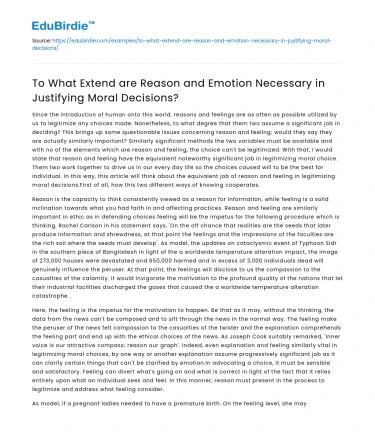In the realm of moral philosophy, a persistent debate centers on the respective roles of reason and emotion in ethical decision-making. While traditional philosophical approaches have often emphasized rational deliberation as the cornerstone of moral judgment, contemporary research in moral psychology and neuroscience suggests that emotions play an equally vital role in shaping our ethical choices. This essay argues that both reason and emotion are necessary components in the justification and execution of moral decisions, as they serve complementary functions in our ethical framework. The interplay between rational analysis and emotional engagement enables us to make more comprehensive and nuanced moral judgments that reflect both our capacity for logical thinking and our fundamental human nature.
The Tension Between Reason and Emotion
The philosophical tradition has long grappled with the relationship between reason and emotion in moral decision-making. Enlightenment philosophers, particularly Kant, emphasized the primacy of reason in moral judgment, arguing that truly ethical decisions must stem from rational principles rather than emotional impulses. Kant's categorical imperative, which posits that moral actions should be based on universalizable maxims, exemplifies this rationalist approach. However, this perspective overlooks the fundamental role that emotions play in motivating moral behavior and providing the initial intuitions that guide our ethical reasoning.
Save your time!
We can take care of your essay
- Proper editing and formatting
- Free revision, title page, and bibliography
- Flexible prices and money-back guarantee
David Hume's contrasting view that reason is "the slave of the passions" highlights the essential role of emotion in moral decision-making. Hume argued that moral judgments ultimately derive from emotional responses rather than pure reason alone. This sentiment-based approach recognizes that our capacity for empathy, compassion, and moral outrage often serves as the foundation for our ethical deliberations. Modern research in moral psychology has largely vindicated Hume's insights, demonstrating that emotional processing is integral to moral judgment and decision-making.
The Complementary Nature of Reason and Emotion
Rather than viewing reason and emotion as opposing forces in moral decision-making, contemporary understanding suggests they function as complementary systems. Emotional responses provide the initial moral intuitions and motivational force that drive ethical behavior, while reason helps us analyze these intuitions, test their validity, and reconcile conflicts between competing moral claims. This dual-process model of moral judgment better explains how we actually make ethical decisions in real-world situations.
Emotional engagement enables us to recognize the moral significance of situations and motivates us to act on our ethical principles. For instance, witnessing suffering triggers empathetic responses that prompt us to help others, while feelings of moral outrage drive us to address injustice. These emotional reactions serve as essential moral alarms, alerting us to situations that require ethical consideration. Without such emotional engagement, we might recognize moral principles abstractly but lack the motivation to act on them.
Rational analysis, however, is equally crucial for developing and justifying coherent moral frameworks. Reason allows us to examine our emotional responses critically, identify potential biases, and evaluate the consequences of different courses of action. Through rational deliberation, we can develop consistent ethical principles, resolve conflicts between competing moral claims, and justify our decisions to others. This analytical process helps ensure that our moral judgments are not merely based on fleeting emotions but grounded in carefully considered principles.
The Practical Integration in Moral Decision-Making
The integration of reason and emotion in moral decision-making becomes particularly evident when examining complex ethical dilemmas. Consider the case of medical triage during a crisis: healthcare workers must balance emotional responses of compassion for individual patients with rational analysis of how to allocate limited resources for maximum benefit. Neither approach alone would be sufficient – pure emotion might lead to unsustainable favoritism, while pure reason might ignore important human factors and values.
Similarly, in addressing environmental ethics, both emotional connection to nature and rational analysis of scientific data are necessary for developing effective responses to climate change. Our emotional attachment to the natural world motivates conservation efforts, while rational analysis helps us develop practical solutions and evaluate their effectiveness. This integration of feeling and thinking enables us to address complex moral challenges more effectively than either approach in isolation.
Conclusion
The justification of moral decisions requires both reason and emotion working in concert rather than in opposition. Emotions provide the initial moral intuitions and motivational force that make ethical behavior possible, while reason enables us to analyze these intuitions critically and develop coherent moral frameworks. Understanding this complementary relationship helps us make better ethical decisions by engaging both our capacity for logical analysis and our emotional intelligence.
Moving forward, this understanding has important implications for moral education and ethical development. Rather than attempting to suppress either reason or emotion, we should focus on developing both capabilities and learning to integrate them effectively in our moral deliberations. This balanced approach will better equip us to navigate the complex moral challenges of our contemporary world while remaining true to our nature as beings capable of both thought and feeling.






 Stuck on your essay?
Stuck on your essay?

